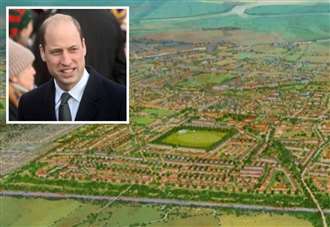The team behind a controversial 2,500-home development proposed for land on Prince William’s Duchy of Cornwall estate in Kent has revealed a plan it claims will “galvanise” the needs of the community.
The Duchy has prioritised four commitments in order to deliver “fair growth” in what it says is going “beyond the norms of development” in its proposals on the outskirts of Faversham.

The ambitious plans – which have attracted fierce public backlash and hundreds of objections – include a new primary school, shops and healthcare facilities on a sprawling site stretching from the edge of the town towards Brenley Corner, where the M2 and A2 meet.
But among its pledges, the Duchy says it will develop close ties with “local supply chains” as well as providing skilled jobs, training and apprenticeships for the town during the course of the estate’s 20-year build.
A report investigating how the South East Faversham project will “maximise the social, economic and environmental benefits” for the area was published last week.
Carried out by the Thames Estuary Growth Board (TEGB), the development is the first test case to ensure it is “fair, and that prosperity must reach everyone, not just a few”.
It says the Duchy must commit to providing “longer term, secure and affordable tenancies and test new tenure models” for residents in order to deliver “appropriate affordable housing”.
The team has already pledged to build 875 affordable homes, with 50% of those for social rent, in its planning application submitted to Swale Borough Council.


Asked whether residents could be reassured it would not backtrack on those commitments should the project not prove economically viable, a spokesperson for The Duchy said: “By working with the TEGB and the community, we are taking an open and informed approach to development delivery in order to support the local community.”
Also included in the report is the promise to “install a long-term steward” who will oversee and “improve infrastructure” for the town overall.
The role is expected to ensure residents in the town can access job opportunities from the new services linking the development, such as community facilities, schools and shops.
The report said its research found how “local tradespeople often feel disconnected from job opportunities arising from new developments” and that work does not go to residents in Faversham.
To address this, the Duchy says its development partners will work with businesses to “develop local supply chains to enable local employment and work with local partners for training and apprenticeships into long-term well-paid employment”.
The planning application has received hundreds of objections on the Swale council planning portal for the project’s first phase of 261 homes.

Fears persist over the controversial scheme, with critics arguing about the development’s impact on neighbouring areas.
Opponents claim it will see 320 acres of high-grade farmland concreted over, while creating traffic chaos and air pollution, and putting extra strain on services such as GP care – although healthcare provision is part of the Duchy’s masterplan.
The Duchy told KentOnline: “This study helps to identify how development can create positive social and economic opportunities for communities most disadvantaged in the town and will help to set the social outcomes required from the development to better support them.
“We hope other developers do and will follow such approaches.
“The Duchy of Cornwall has always gone to great lengths to understand and engage with the communities local to where it develops.
“The TEGB report has enabled a more granular level of understanding that helps to galvanise all of these local organisations with the Duchy to address the underlying needs of those in the community most in need of support, whether through access to employment, training. social housing or other support.”

The Duchy has also committed to “encourage long-term community engagement and participation in the management and use of green spaces and community facilities” throughout the development.
It is also aiming to develop “climate-resilient homes” and reserve 50% of the site for nature and food-growing, while also laying out streets to “ease pressure on the A2” and promote walking and cycling through the site.
The Duchy of Cornwall estate provides the heir to the throne with a direct private annual income of £23 million.
Prince William is the 25th person to hold the title after inheriting it when his father, King Charles III, ascended the throne.
Will Bax, secretary and keeper of the records at the Duchy of Cornwall, said: “We have worked with the TEGB to test how we can maximise the social, economic and environmental benefits of South East Faversham.
“The narrative of growth can be excluding to many. For us, it’s about supporting a future that serves local people well with homes, jobs, amenities and a place they are proud to call home.

“This report gives better evidence that South East Faversham will support local people.
“Many conversations – from the mother who told me her son had to move to Sittingbourne for an affordable start, to businesses looking for local talent – remind us of why this matters.
“Our goal is clear: create a future where people are enabled to thrive. And ensure South East Faversham sets an example for others to follow.”
TEGB chair Kate Willard added: “We have been incredibly impressed to see the Duchy responding seriously to the principles of Fair Growth and Investment we’ve set out.
“A neighbourhood of this scale has to deliver for local people – not just in the long term, but right from the start.
“What’s been put forward here shows real potential, and we’ll be looking for other major developments to follow suit.”
Swale Borough Council is yet to decide on the planning application, with a decision expected later in the year.
